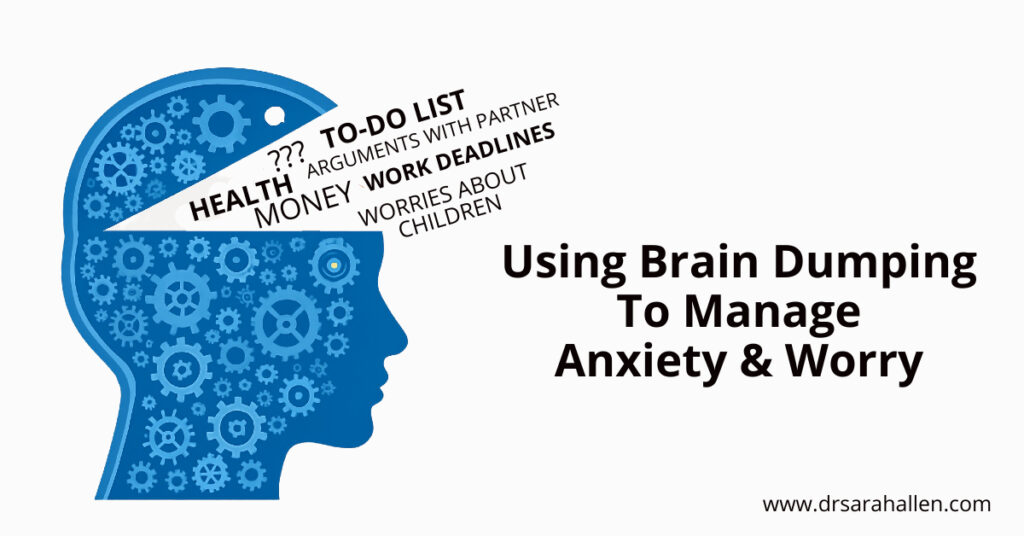
Do you find yourself reading too much into situations or spending too much time trying to make decisions? You are likely overthinking things and it is probably not helpful to your emotional well-being as overthinking can cause worry and anxiety!
Here are 5 signs that suggest you overthink things and some simple steps to help you stop. We will also look at how a type of therapy called Cognitive Behavior Therapy, or CBT, can help reduce overthinking.
1. Rumination Is Causing Overthinking

A clear sign you are overthinking is that you spend a lot of time ruminating, which is the act of continuously thinking about a problem without finding any solutions.
You pick over situations and conversations in your brain that could have happened last night or perhaps several years ago, and yet you are still thinking about it. It is exhausting. You are wasting your emotional energy thinking about it and it can leave you feeling physically and emotionally drained.
Rumination can be addressed through CBT. By breaking down problematic thoughts into smaller components, individuals can begin to understand why they are having certain thoughts and develop coping mechanisms to reduce their impact on daily life.
Ask yourself is there actually anything you can do about the situation you are ruminating about? Can you go to the person and ask them why they did (situation you are ruminating about) or can you go to them and say what you wish you had said back then? When I ask my ruminating clients these questions they usually laugh and say no, it’s too long ago or they would think I am being silly.
If you don’t want to, or can’t, change anything about the event then you have to accept that it is in the past. You can learn from it if a similar situation comes up again but you can’t change it, so let it go! Try to focus on something you can change instead.
To read more about reducing worry and rumination read How to Stop Ruminating: Proven Strategies and Techniques From An Anxiety & Depression Expert
2. Perfectionism Can Cause Overthinking

Do you agonize over decisions, afraid to make even the smallest mistake? If so, you may be a bit of a perfectionist. While striving to do well at school, work or while doing your hobbies, can reap great results, no one can do everything perfectly and striving for perfection can lead to overthinking and in a lot of cases, anxiety. The fear of making mistakes, or failing, can be completely overwhelming, and worrying about what people think about you can lead to overthinking your every action, which to extremes can be paralyzing.
Cognitive behavioral therapy (CBT) is one type of therapy that can be very helpful in managing perfectionism. By being aware of our fears and worries, we can begin to understand how our thoughts contribute to our perfectionism. Then rather than overthinking, or ruminating about a situation, you can break down task components into small manageable steps, recognizing what you have managed to achieve rather than aiming for flawless results. Try to bring your focus on doing your best and accepting that is good enough. If you want to achieve more than ‘good enough’ what would that even look like and is that even humanly possible? Who do you know that actually reaches perfection in everything they do? No one, as mistakes are a natural part of life.
For more about perfections read The Connection Between Perfectionism & Anxiety
3. Overthinking Causes You To Not Be Emotionally Present Around Others

Overthinking things can lead to you spending a lot of time in your head, which means you’re not completely emotionally present when you are around others. If you are focusing on your thoughts rather than the person in front of you, it can make them feel that you are not interested in them or what they are saying to you, which of course can be detrimental to the relationship.
Try to catch yourself if you are doing that and instead ground yourself by really focusing on the person you are with or your surroundings. Bring your attention to how your feet feel strong as they press into the ground, focus on actually listening to what the person is saying, notice what other sounds or things you can see in the room. Bringing your focus back into your body, the environment you are in and the person you are with gets you out of your head therefore making you more present.
Overthinking often involves What-If thoughts read ‘What-if’ Thoughts and Anxiety & How to Stop Them
4. Overthinking Affects Your Sleep

Another sign that you are an overthinker is that you are sleep deprived because your ruminations are stopping you falling asleep or are waking you up in the middle of the night. When you are overtired you become more emotional, anger more easily and have less focus and concentration which can hurt your functioning and relationships in real life, not the imaginary life of your thoughts.
You can overcome this by setting aside a time each evening that you sit down and write out the things you are thinking about. This can clear your head for when you are trying to sleep. More about how to do this in the section about CBT towards the end of the article.
To read more about sleep and ways to improve it read How To Manage Anxiety At Night
5. You Let Your Anxiety Hold You Back

You really know that overthinking is holding you back when anxiety prevents you from doing things or moving forward in your life. Usually this involves thoughts about “What if?” and then thoughts about all the things that could possibly go wrong.
In cognitive therapy we call this type of negative thought pattern ‘catastrophizing’. You go to all sorts of worse- case scenarios and that can make you very stuck and scared. I always think a good way to challenge this is to ask yourself “What is the worst thing that can happen?”. Catastrophizing thoughts are attached to very strong emotions as fear whips up our adrenaline system. However, if you breathe (to calm down the adrenaline) you can rationally challenge your thoughts and find that the worse things probably aren’t nearly as bad as your emotions suggest and that you could cope with them.
To overcome this pattern, take a problem-solving approach. Identify what is holding you back and what small steps you can take to overcome the problem. Rather than just going around and around thinking about it, take action in a way that is not too much outside of your comfort zone.
To read more ways to reduce anxiety read 10 Simple Hacks to Reduce Anxiety and Worrying
How Does CBT Help To Stop Overthinking?

Cognitive Behaviour Therapy (CBT) looks at how your thoughts (also called cognitions) affect your emotions and how both thoughts and emotions affect the way you behave. Typically CBT therapists are not just teaching you the simple steps I discuss below, they gain awareness of all the stressors, physical and emotional, you have going on but these strategies are useful first steps so perhaps try them out by yourself and see if they help.
Firstly, download all the thoughts and worries that swirling around in your brain by writing them down on a piece of paper. This is called Mind Dumping and can be done in bullet points or written out in paragraphs, depending on your preference.
Next go over each separate thought/worry and analyze the accuracy of the thought (termed Thought Analysis) and then ask yourself if there is a different, more helpful, way of looking at the problem/thought that you wrote down. I think real life examples can help describe this process.
E.g. Julie was lying in bed, unable to sleep because she was ruminating about the evening before when she was out with some friends and one of her friends (Helen) seemed annoyed. Julie was worried that Helen was upset with her, which led to other worries that people don’t like her and she doesn’t have friends (in CBT terms this is Catastrophizing).
When Julie asked herself “what evidence do I have that I have annoyed Helen?” she couldn’t remember anything in particular that she had done, or said, and when she asked herself “Did Helen seem annoyed with anyone else?” (yes) and “Does Helen have anything stressful going on in her life at the moment?” (yes) she concluded that Helen probably wasn’t upset with her personally and was probably stressed because she had found out some bad news recently. Julie also decided that if Helen seemed annoyed next time they met up, she would subtly ask Helen if she had done something to upset her.

Catastrophizing, Personalization and Jumping to Conclusions are three common thinking errors that can be addressed with Cognitive Behavior Therapy (CBT). Recognizing negative thought patterns and distortions, which can lead to negative emotions such as sadness, anxiety, anger etc., is the first step in changing those negative thoughts into more helpful or realistic ones which can then change emotions to more positive ones.
CBT also helps people to think about things in a structured way and decide whether they want to take some action towards solving the problem (this is the behavior part of CBT) which stops overthinking. This is a simplified way of discussing CBT and of course, in real life there are usually lots of thoughts that get tangled up together and it can be very helpful to have a few sessions with a CBT specialist to teach you techniques in a way that are relevant to your life and worries.
An important part of Cognitive Behavioral Therapy is keeping track of unhelpful thoughts, (also called cognitions). When working with a mental health professional who specializes in CBT you identify Cognitive Distortions and together you can look at where these types of thoughts come from, how they are holding you back and how to think about things and reframe your thoughts in a way that improves your mood.
To help manage overthinking, anxiety and rumination, I recommend using a Thought Diary. This tool provides structure to identify unhelpful negative thoughts. If you prefer, simply writing them down on paper works too. Page 2 of the diary offers questions that assist in challenging these thoughts as just because we have a thought, it doesn’t mean it is true! Cognitive Behavioral Therapy (CBT) emphasizes tracking these unhelpful thoughts, also called cognitions. A CBT specialist can help identify cognitive distortions and explore their origins, how they limit you, and guide you towards reframing your thoughts for an improved mood.
For more in-depth information about CBT for Anxiety read CBT for Anxiety: What It Is and How It Works

Click link for Dr. Sarah Allen Thought Diary Page 1
Click link for Dr. Sarah Allen Thought Diary Page 2

If you have any questions, or would like to set up an appointment to work with me and learn how to reduce anxiety, please contact me at 847 791-7722 or on the form below.
If you would like to read more about me and my areas of specialty, please visit Dr. Sarah Allen Bio.
Dr. Allen’s professional license only allows her to work with clients who live in IL & FL & the UK and unfortunately does not allow her to give personalized advice via email to people who are not her clients.
Dr. Allen sees clients in person in her Northbrook, IL office or remotely via video or phone.

What Can I Read That Helps Me While I Am Waiting For My First Appointment With Sarah?
Download this free booklet to gain valuable insights and practical strategies for managing anxiety and worrying.











































